9 Ways to Improve Your Mental Health at Work

In this article
Experiencing mental health problems associated with your job might not only prevent you from enjoying what you do but also negatively affect other areas of your life.
While mental health in the workplace is a hot topic now, companies still have a long way to go when it comes to supporting their employees’ well-being. One solution that’s gaining traction is the utilization of online therapists, who can offer guidance and support without the need for in-person visits.
Luckily, you can always learn how to take care of yourself.
How common is stress at work?
If you’re wondering whether you’re the only one who feels distressed at work or even dreads going to work in the first place, you aren’t alone.
Many people seek advice on how to deal with workplace anxiety on online forums. And according to recent statistics, 25% of surveyees admit that their job is their number one stressor, while 85% experience work-related stress.
Unfortunately, as common as it is, it’s not something you should simply accept. Living under constant stress might decrease your productivity and make you more prone to developing mental health issues.
The relationship between mental health and employment
People with mental health issues are 2-3 times more likely to be unemployed as they might not have the energy and motivation to look for a job or struggle to keep it.
Even if poor mental well-being doesn’t negatively impact your career yet, you might underperform and eventually experience burnout – an increasingly common problem that two-thirds of Americans have suffered from at some point in their lives.
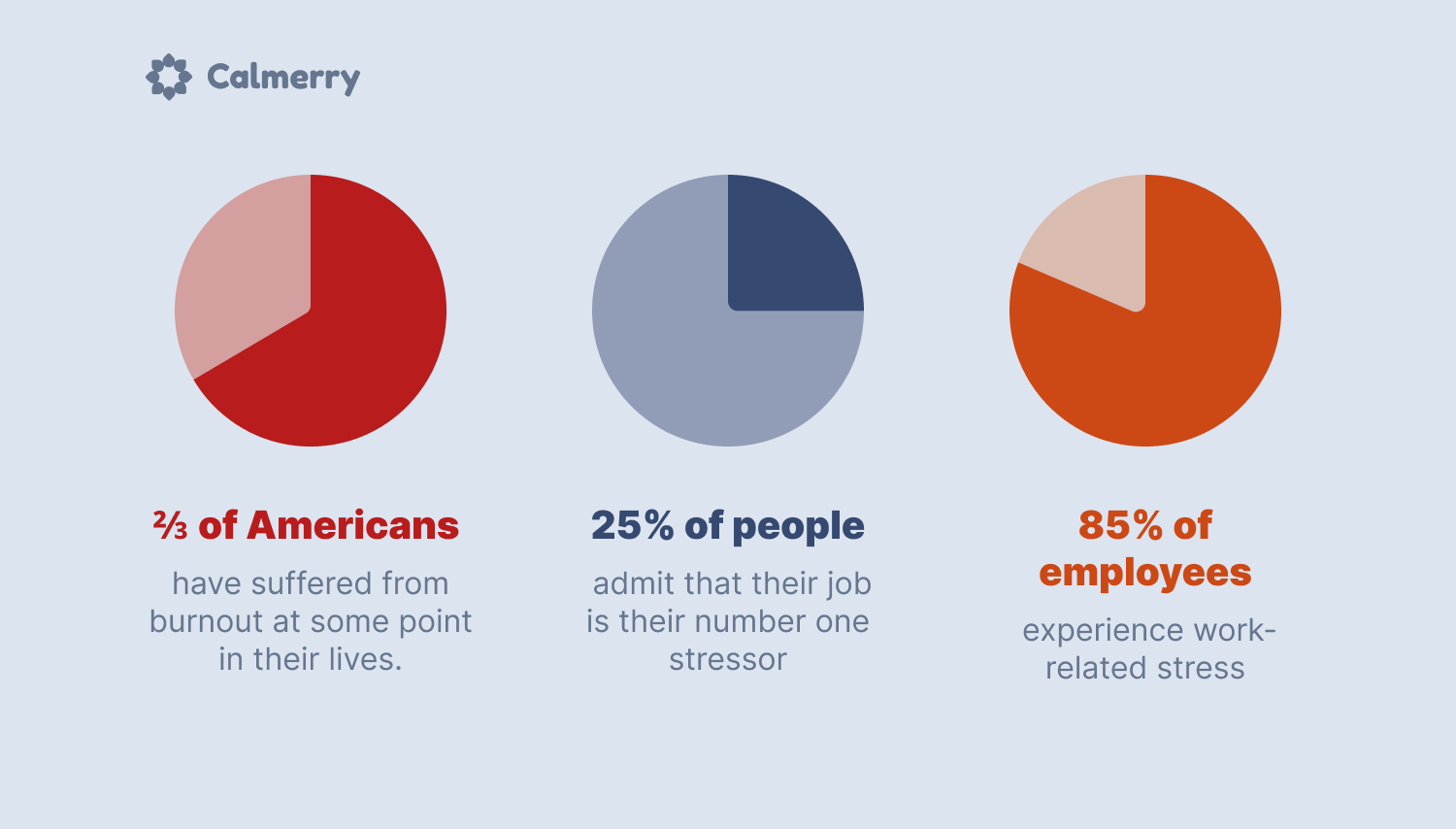
Ways to improve mental health at work
Many people who experience workplace anxiety comfort themselves by saying that work isn’t supposed to be their whole life. So it’s okay to have a love-hate relationship with it.
However, while our profession doesn’t have to be our priority, we spend most of our time at work. So taking care of our mental health and addressing the sources of anxiety and stress is extremely important. Here’s how:
1. Identify the reasons behind your stress
There are many reasons why work might make you feel stressed. The tasks might be too difficult. Or your company might foster a corporate culture that prioritizes results over employees’ mental health. Or you might be experiencing problems in your personal life. Or the job might not be a good fit for your personality and values.
Whatever the reason, identifying it can help you view your situation more like a problem you can solve rather than a reality you’re stuck in. And it can help you figure out the most effective ways to handle stress.
Journaling is the best way to get to know your stress a bit more. Whenever you experience negative emotions associated with your job, write down whatever comes to your mind. You can also ask yourself direct questions, such as ‘What am I scared of?’ and notice what thoughts pop up first.
2. Is it stress, or is it burnout?
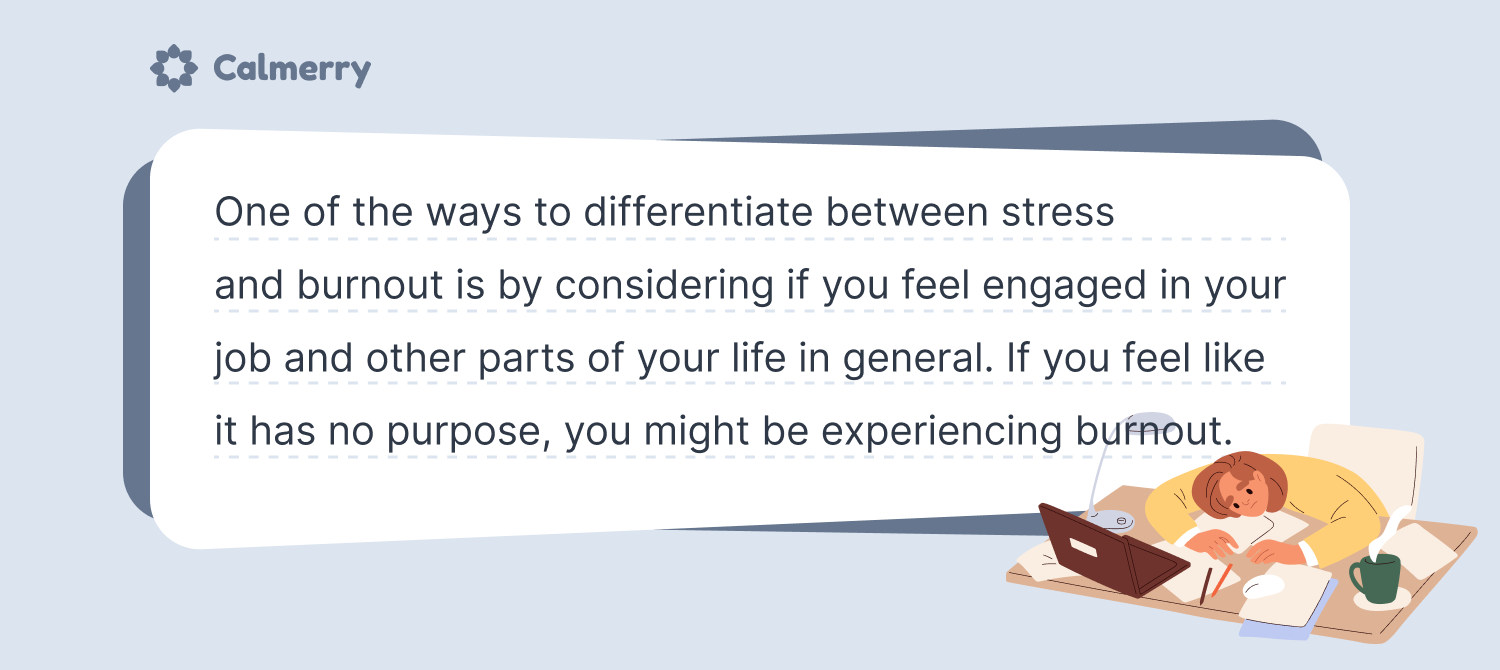
Even though both terms are often used interchangeably, they aren’t the same. Stress is an emotional and mental state that improves once the stressor is removed but might sometimes turn into a chronic state.
For example, you experience a sense of relief when you complete a project. But if you constantly face difficult tasks at work, you might end up being stressed all the time, and the relief might be fleeting.
However, burnout is defined as mental exhaustion and a feeling of hopelessness that might be a response to chronic stress. It’s more difficult to treat. One of the ways to differentiate between the two is by considering if you feel engaged in your job and other parts of your life in general.
If you feel like it has no purpose, you might be experiencing burnout, which you may need to treat with the help of a therapist.
3. Work on your work-life balance
When your mental health suffers because of work, you might struggle not to think about it when you get home – so you don’t give yourself a chance to rest.
To improve your work-life balance, the easiest place to start is to make sure you don’t check emails after working hours and schedule self-care activities that can help you relax.
For example, many people treat themselves to their favorite food, spend quality time with their family or have a hot bath. If your job mostly consists of remote work, do it in a room you can remove yourself from for the rest of the day once you’re done.
4. Know your limits
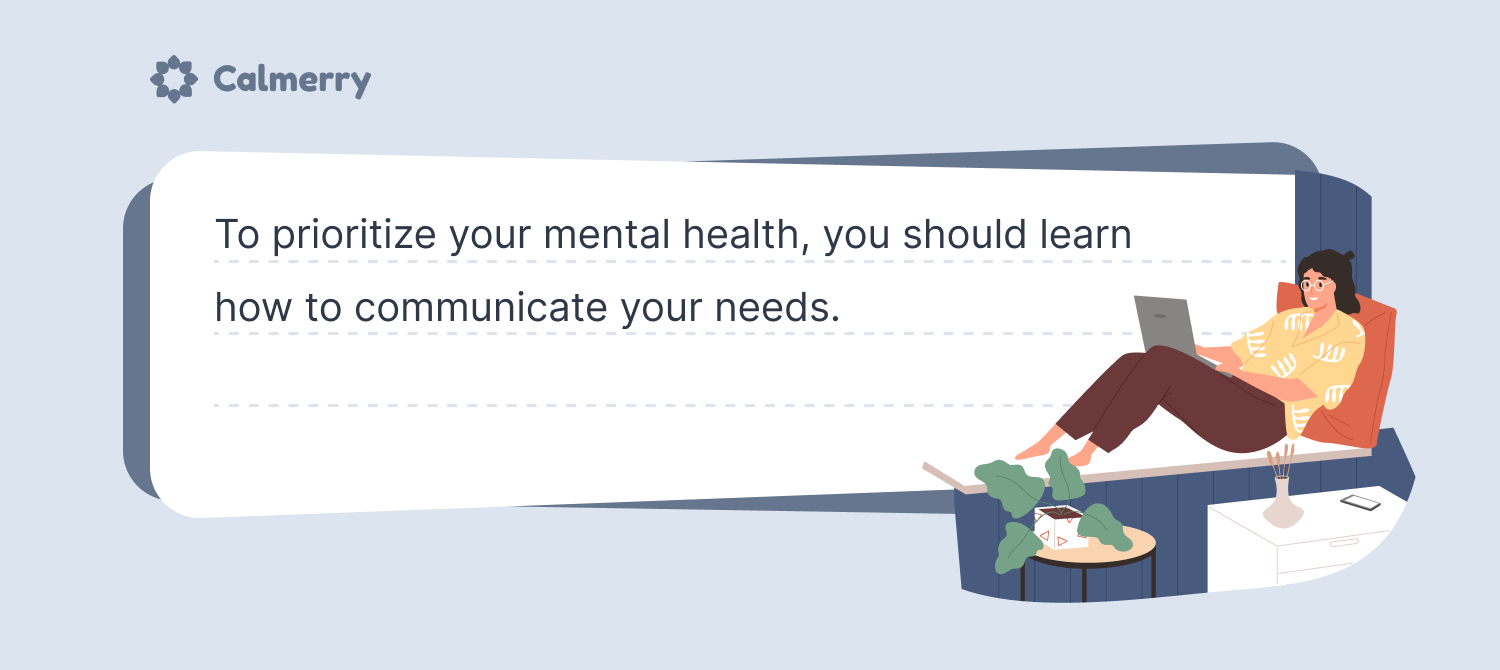
Many people might struggle to set boundaries at work because they feel like they can’t say ‘no’ and are afraid they might lose their job if they do. But to prioritize your mental health, you should learn how to communicate your needs.
First, consider your limits: taking on another project might show that you’re a great employee. But if you get too overwhelmed, you might struggle to perform well in the future.
Then make sure to communicate your boundaries clearly: ‘I’ll answer the phone during working hours’, ‘I can’t stay after hours on Wednesdays’.
And don’t give up when someone disrespects them. Keep reminding them until you no longer have to.
5. Work on relaxation techniques
Workplace anxiety might have a specific cause. If you get assigned more work than you can handle, you won’t feel relaxed in that environment. In this case, the sensible thing to do would be to talk to your boss to have them reduce the number of tasks you have to do.
However, anxiety might make it impossible to resolve the problem, so you should learn how to decrease it first.
One of the best relaxation techniques is yoga as it often combines mindfulness with physical activity. A lower-impact exercise lowers stress hormones in your body and increases feel-good hormones at the same time.
It also helps you develop a deeper connection with yourself as you spend more time grounded in the present and listening to your body’s needs.
Another option is meditation. If you’re under constant stress due to work, you might be reluctant to try meditation because you might see it as another to-do task to add to your list.
However, you can try guided meditation which only requires you to listen and follow the instructions. There are many free videos available online.
6. Use words of affirmation
Make words of affirmation a part of your routine. You’re the person you’re going to spend the rest of your life with. So you should remember to encourage yourself and be your biggest cheerleader.
Tell yourself how great you are every day before work: ‘I’m amazing’. But also use words of encouragement: I’ll do well today’, ‘I have skills and experience that make me a great fit for this job’.
7. Set meaningful goals that inspire you
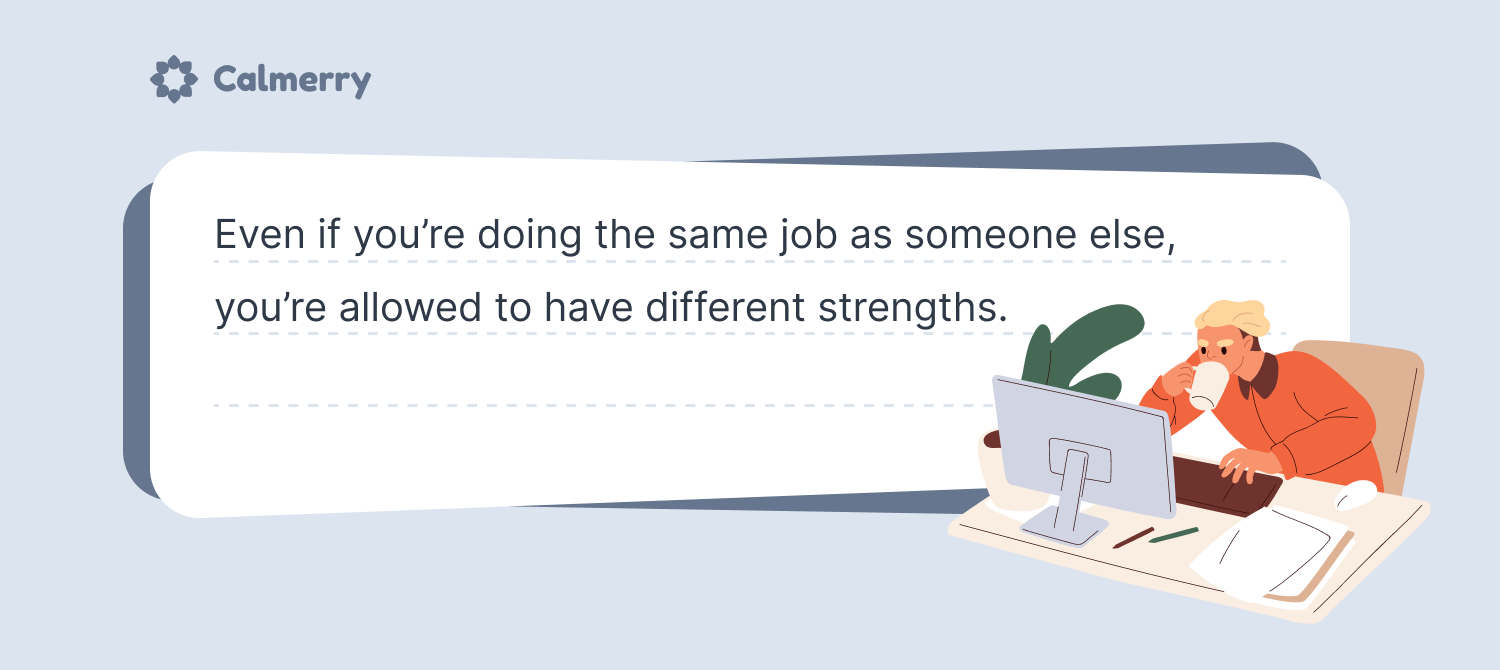
Learn how to set goals that not only ensure your professional development but also support your mental health.
For example, if you’ve just started working at a new company, you shouldn’t measure your success by looking at the achievements of co-workers who are a few years of experience ahead of you. This kind of comparison will only put a lot of pressure on you and make you feel inadequate.
Even if you’re doing the same job as someone else, you’re allowed to have different strengths.
Whenever you set a goal, break it down into smaller segments and keep in mind your experience when you do. Make it difficult enough to challenge yourself but also suited to your level of expertise and not too overwhelming.
8. Embrace gratitude culture
It is an employer’s responsibility to create a welcoming environment that helps support mental health at work. This can be done by cultivating a gratitude culture that involves appreciating employees’ efforts.
For example, a boss might show that they value their employees by organizing weekly meetings during which they use verbal praise to acknowledge people’s successes.
If this isn’t the case at your workplace, you can always create a gratitude culture on your own. Simply thanking your co-workers for helping you or congratulating them on their wins can encourage them to do the same for others.
You can also list things you’re grateful for, which can increase your mood. Studies show that gratitude culture predicts both high job satisfaction and performance.
9. Seek professional help
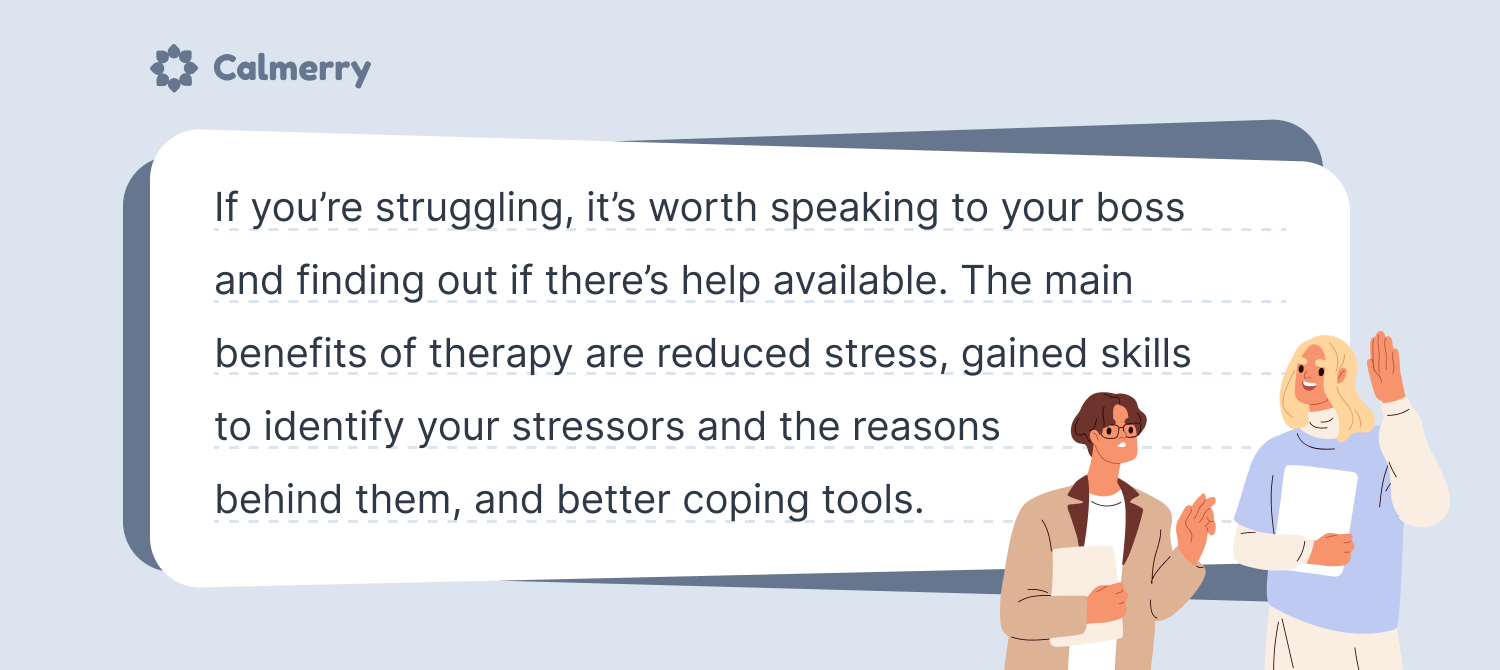
Since more and more people struggle now, a lot of companies aim to raise awareness around workforce mental health and have started offering corporate benefits programs that provide counseling with a mental health professional.
If you’re struggling, it’s worth speaking to your boss and finding out if there’s help available. The main benefits of therapy are reduced stress, gained skills to identify your stressors and the reasons behind them, and better coping tools.
For example, you might believe that you experience workplace anxiety because you are assigned stressful tasks or because you compare yourself to others. But the underlying issue is that you’ve always had low self-esteem, and you should address it first.
If your company can’t accommodate your needs, you should consider seeking therapy on your own. While it can be costly, as long as you can afford it, there’s nothing to lose and a lot to gain. When you’re working with an experienced therapist from Calmerry, you can learn skills that you can apply to other aspects of your life.
You might also want to look into online therapy – which can be as effective as in-person treatment but more accessible.
online therapy
live video session


